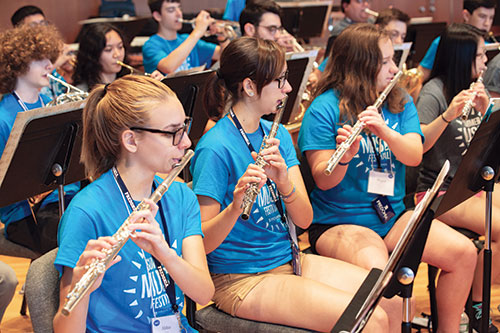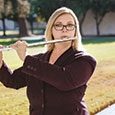Summer is just around the corner. Students far and wide will soon begin preparing for summer music programs where they will acquire a number of new performing techniques and priceless musical experiences. I find that many of the lessons I learned at music camp have indeed stood the test of time. In many ways, attending summer music camp has shaped me into the flutist I am as an adult. The following are some important lessons I learned at summer music camp.

1 Make friends and practice in small groups. Some of the instrumentalists you meet at music camp just may turn into life-long colleagues. Creating these connections while you are working on shared goals at camp opens the door to future collaborations down the road. The friends I made during my summer at the Interlochen Summer Arts Camp eventually became some of my closest connections and, thanks to social media, remain very much part of my musical life to this day. A great way to establish these relationships during the short time spent at music camp is to practice in small groups. This promotes a strong sense of community while strengthening budding ensembles skills in both large and small group contexts. These are two critical elements in musical development that are often taken for granted.
2 Determine your most productive practice times. Some musicians prefer to drill scales early in the morning while others rely on the energy of the evening to inspire concentrated work on repertoire. Music camp is a good time to experiment by practicing at different times of the day. When I was a young student attending the Lionel Hampton Summer Music Camp at the University of Idaho, I often practiced in the morning and late afternoons to free up evening hours to attend recitals and spend time with family. I soon realized that my energy was naturally low in the morning hours, and my focus was less on the music and more on the impending activities of the day. That fall I pushed my practice sessions to later in the afternoon after school. This worked well for memorization work, but my energy would dwindle as soon as dinner time rolled around. In high school I attended the Interlochen Summer Arts Camp and began to practice in the evening. The day was done, and I could set everything else aside to focus on the music. To this day, I tend to practice between the hours of 8:00-10:00 pm. The freedom from your regular schedule allows you to experiment with different practice times while at camp. Understanding what works best for you will help energize practice sessions throughout your career.
3 Classical flutists are often stereotyped as being overly competitive. With contests for chair placement and solo opportunities, it is easy to fall into the “me vs. them” mentality with fellow musicians. Camp offers an opportunity to temporarily change your attitude (especially if you find yourself stressed about getting ahead). Rather than trying to outplay everybody around you to get that coveted first chair position, use the time to improve your playing and encourage your new flute friends to improve their own playing without trying to beat them. This positive attitude will promote a strong sense of camaraderie and strengthen both your networking skills and general musicianship. In the end, you will be a better flutist and will likely establish important connections with other flutists.
4 Seize the opportunity to completely immerse yourself in music. With camp lasting for only a set duration of time, you can push yourself to the edge of your ability and practice beyond your current playing level. Is there a piece of music that you would love to learn but do not think is within your capabilities? Use camp as a chance to try it out. What techniques can camp instructors suggest to make your music not so intimidating? Try them out. Try to absorb everything and learn something new from all the music created around you. I used to keep an observation journal for this purpose. I could record the names of pieces I liked, practice suggestions from instructors, ideas for different types sounds I would like to emulate, and anything else that inspired me. Keep these notes and use them to challenge yourself once you are back home.
5 Chamber music groups are valuable and fun. Really listen to the instruments around you. How can you melt seamlessly into the sound of an oboe or a French horn? Listen to your intonation and think about the natural tendencies of the instruments around you. Practice using eye contact and body language for cues and tutti playing. Identify places where you function as melody versus passages where you are part of the accompaniment. Think about how you should adjust your playing during these passages to make room for the melody. This is a great opportunity to practice how effectively you communicate musically and non-musically with your colleagues.
6 Ask the experts questions. Attending music camp provides a valuable opportunity to get advice from a wide variety of teachers with a vast array of ideas and experience. Make sure to schedule a private lesson or two with the primary flute instructor. Confront all of your musical demons no matter how big or small. How would you like your sound to change? Do you struggle with some of the fingerings in the high register? How is your sightreading? How is your intonation? The experts are there to help you improve, but in order to take advantage of their advice, you must be a bit vulnerable about your flute playing and open to new ideas. Take advantage of the unique opportunity to study with the best of the best.
7 Remember that first chair is not everything. Try to learn new skills no matter what your chair placement and work hard to improve with every passing day. Performing second flute is often more difficult than playing principal. If you are given a second flute role, you may sometimes feel that the conductor does not believe that you capable of playing principal. This is not necessarily true. The reality is that you were likely selected for that position because you have the potential to be a gifted chameleon. Blending, listening, matching, and supporting is often more challenging than projecting beautiful melodies. Take every chair placement as an opportunity to learn new approaches and add to the ensemble. A good principal flute should be able to play all of the parts from third or fourth flute to piccolo. Your position in regular school ensembles may be relatively set, so camp is a great place to experience a greater variety of roles.
8 Attend performances. Part of immersing yourself in your music is learning through watching and listening to others. Keep an observation journal to make notes about things you want to bring into your own playing. I still have some of the observation journals that I used in high school and college and consult them whenever I am looking for new ideas. Listen critically and if possible bring a score and discretely follow along with the music. Write down anything that you hear or see that seems particularity effective or inspiring. Consider how you might translate these performance elements into your own practice or build upon them to create something new.
9 Explore new repertoire. You may love it, or it may not work out, but music camp is a good time to give it a go. I was lucky in my youth to attend a high school with a strong music program and a fierce-as-nails flute section. It was considered taboo to practice a piece that another flutist was preparing for competition season, so opportunities to check out one of the beloved pieces in the flute studio were generally restricted to at-home practice or summer studies. I listened intently to all of the pieces played in flute studio and took notes on works I heard other flutists perform at competitions. By the time I went to summer music camp, I had a good list of pieces I wanted to read through. I took some of my favorites to the assigned flute teacher and began to work on fundamental concepts for each work. By the conclusion of music camp, I knew which pieces I wanted to program for the upcoming school year, and what elements I would need to master to play them.
10 Bring everything you have learned back to your practice room at home. Music camp is the best time to act as an informational sponge. Learn as many new techniques as possible, experiment with new pieces, postures, articulations, crazy extended techniques, and connect with new flute friends far and wide. The time you spend at summer camp provides a lifetime of memories and valuable lessons. I cherish the summers I spent at music camp and still draw upon many of these experiences in my adult flute career.






